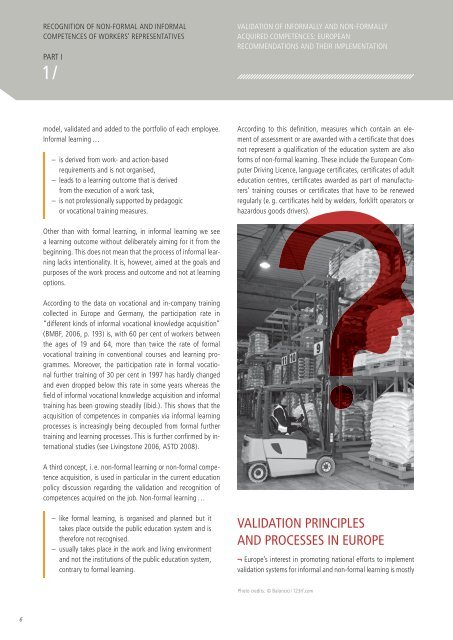RECOGNITION OF NON-FORMAL AND INFORMAL ... - Solidar
RECOGNITION OF NON-FORMAL AND INFORMAL ... - Solidar
RECOGNITION OF NON-FORMAL AND INFORMAL ... - Solidar
You also want an ePaper? Increase the reach of your titles
YUMPU automatically turns print PDFs into web optimized ePapers that Google loves.
<strong>RECOGNITION</strong> <strong>OF</strong> <strong>NON</strong>-<strong>FORMAL</strong> <strong>AND</strong> IN<strong>FORMAL</strong><br />
COMPETENCES <strong>OF</strong> WORKERS’ REPRESENTATIVES<br />
PART I<br />
1 /<br />
VALIDATION <strong>OF</strong> IN<strong>FORMAL</strong>LY <strong>AND</strong> <strong>NON</strong>-<strong>FORMAL</strong>LY<br />
ACQUIRED COMPETENCES: EUROPEAN<br />
RECOMMENDATIONS <strong>AND</strong> THEIR IMPLEMENTATION<br />
model, validated and added to the portfolio of each employee.<br />
Informal learning …<br />
– is derived from work- and action-based<br />
requirements and is not organised,<br />
– leads to a learning outcome that is derived<br />
from the execution of a work task,<br />
– is not professionally supported by pedagogic<br />
or vocational training measures.<br />
According to this defi nition, measures which contain an element<br />
of assessment or are awarded with a certifi cate that does<br />
not represent a qualifi cation of the education system are also<br />
forms of non-formal learning. These include the European Computer<br />
Driving Licence, language certifi cates, certifi cates of adult<br />
education centres, certifi cates awarded as part of manufacturers’<br />
training courses or certifi cates that have to be renewed<br />
regularly (e. g. certifi cates held by welders, forklift operators or<br />
hazardous goods drivers).<br />
Other than with formal learning, in informal learning we see<br />
a learning outcome without deliberately aiming for it from the<br />
beginning. This does not mean that the process of informal learning<br />
lacks intentionality. It is, however, aimed at the goals and<br />
purposes of the work process and outcome and not at learning<br />
options.<br />
According to the data on vocational and in-company training<br />
collected in Europe and Germany, the participation rate in<br />
“different kinds of informal vocational knowledge acquisition”<br />
(BMBF, 2006, p. 193) is, with 60 per cent of workers between<br />
the ages of 19 and 64, more than twice the rate of formal<br />
vocational training in conventional courses and learning programmes.<br />
Moreover, the participation rate in formal vocational<br />
further training of 30 per cent in 1997 has hardly changed<br />
and even dropped below this rate in some years whereas the<br />
fi eld of informal vocational knowledge acquisition and informal<br />
training has been growing steadily (ibid.). This shows that the<br />
acquisition of competences in companies via informal learning<br />
processes is increasingly being decoupled from formal further<br />
training and learning processes. This is further confi rmed by international<br />
studies (see Livingstone 2006, ASTD 2008).<br />
A third concept, i. e. non-formal learning or non-formal competence<br />
acquisition, is used in particular in the current education<br />
policy discussion regarding the validation and recognition of<br />
competences acquired on the job. Non-formal learning …<br />
– like formal learning, is organised and planned but it<br />
takes place outside the public education system and is<br />
therefore not recognised.<br />
– usually takes place in the work and living environment<br />
and not the institutions of the public education system,<br />
contrary to formal learning.<br />
VALIDATION PRINCIPLES<br />
<strong>AND</strong> PROCESSES IN EUROPE<br />
¬ Europe’s interest in promoting national efforts to implement<br />
validation systems for informal and non-formal learning is mostly<br />
Photo credits: © Baloncici / 123rf.com<br />
6
















